The Orphan in Me
Generational Trauma in Hyung Seok Jeon’s A Held Posture
I carry my grandfather’s name, a man who died while my mother carried me in her belly. The brakes on his car failed and he slid off an overpass into a telephone pole. My mother, on bed rest at seven months, answered the door when the police came to the house. So, in a way, I greeted them, too.
We all have foundational family stories that are passed down from generation to generation, stories that “explain everything”: what we ran from, why we don’t talk, how we got to be the way we did. Science is showing us, however, that these moments affect more than our conversation around the dining room table. Epigenetics is the study of how the environment and individual experiences can alter our genetic expression, which affects the hormones we release in times of stress. These changes, in turn, are passed along to our offspring. There is a growing body of research into how trauma experienced by a parent—before a child’s conception—is present in the child, affecting them well into adulthood. A 2015 study demonstrated that the genetic effects of PTSD in Holocaust survivors were passed on to their children; the same trait was found in the children of survivors of the 9/11 terrorist attacks. Our parents’ trauma is our inheritance.
Hyung Seok Jeon’s A Held Posture, last performed at Theaterlab in New York City in January, is a quiet meditation on how our familial trauma can become an open wound in our own hearts without us even being aware of it. Jeon performs by himself, using a combination of performance art, found-object puppetry, video, and sound sculpture to take audiences on a journey to the bottom of a metaphorical ocean of feeling—full of paper boats, whale songs, and swim goggles. The piece examines the quiet hurt that we take for granted, how it feels, and how it takes shape in our bodies.
'A Held Posture'…is a quiet meditation on how our familial trauma can become an open wound in our own hearts without us being aware of it.
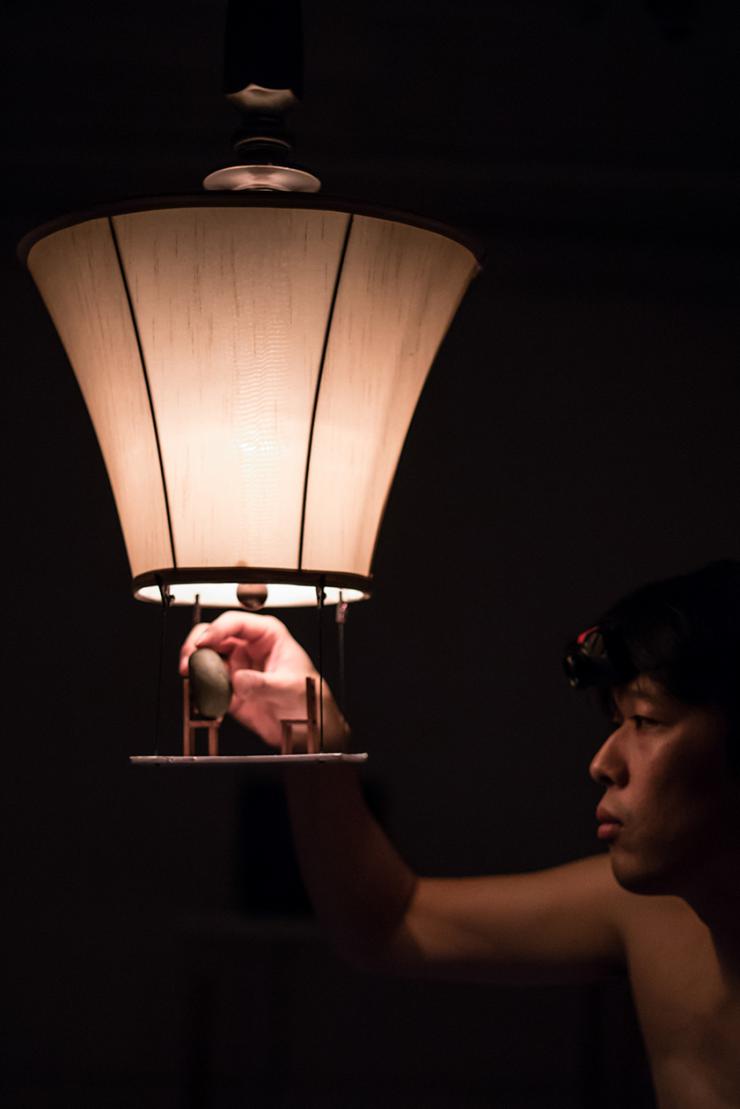
The piece was coproduced with Underwater New York, a nonprofit that commissions work by artists who use New York’s waterways as points of inspiration. A Held Posture is their first time producing for theatre.
Jeon began working on the show while studying devised theatre at Sarah Lawrence. In class, he made a startling discovery: he moved the same way as his father. “We know we inherit more from our parents than personal appearance, but something I learned when I was studying Alexander Technique was that we [also] learn their posture. Through that posture we learn where someone holds their pain.”
As far back as Jeon can remember, his father was a serious man. However, Jeon hadn’t examined what he feels is its origin: his grandfather’s early death, which left Jeon’s father an orphan. “I think [children] learn the pain that [their parents] embody and somehow copy-and-paste it into [their own] body. I thought that if I [dialed] into that, then maybe I [could] find out why I am the way I am.” A Held Posture, if not Jeon’s answer to that question, is his deep interrogation of it.
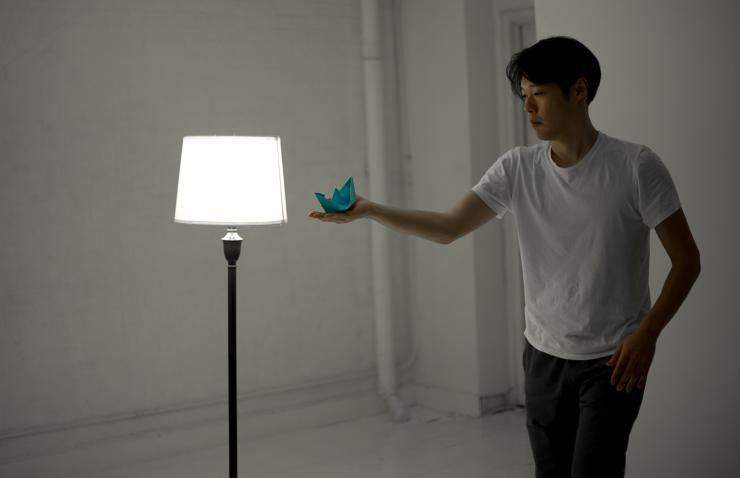
The piece feels like a full sensory immersion from the start. A wireless headset with a friendly blue, glowing LED light is waiting on each seat for audience members to find upon arrival. As soon as we put them on, we hear Jeon’s curtain speech as if he’s standing next to us, whispering in our ear. Once the performance starts, Jeon doesn’t speak a word, but his pre-recorded voice is layered into an immaculate sound collage of waves, water, and music that plays in direct conversation with the action happening. When Jeon brings a box out on stage, his voice explains, like the supertitle in a film, “This is my box.” To a lamp on stage: “This is my father.” And to a rock within the box: “And this is me.”
This “found-object puppetry” is key to building emotional immediacy. “It says something to use an everyday object, to connect to the object, to use the object you know,” says Jeon. “What is the material? What does it do to you? I think there’s a question in that, in how it affects you.” The rock, box, and lamp become our anchors—the protagonists and characters—as we set off on a journey across the room and to the bottom of the sea.
And, of course, what we find when we sink to the bottom is the hurt: a moment from Jeon’s childhood where he fully took on his father’s melancholy. When he was nine years old, Jeon’s father asked him to sit silently with him for “one minute.” Jeon complied, and in that minute of silence, Jeon realized his father’s constant stoic silence and passivity masked a deep sadness, and that Jeon himself had taken on that sadness. During the performance, Jeon declares, “There is an orphan in me.” After the performance, he explains, “It hurt so much, but it [was] my father’s loss. How do I describe that indirect experience?”
Generational trauma isn’t news to the theatregoer. The canon has given us plenty of opportunity to reflect on this inheritance, from Oedipus’s unavoidable fate to Mary Tyrone’s addictions that feed her sons’ habits. And, yet, A Held Posture doesn’t feel like it’s treading the same water. It’s not through the sublime pain of Aristotelian catharsis that Jeon finds his resolution. It’s the exploration, the prodding, and the understanding, which comes through acceptance, that provide us the release.
Still, Jeon is not satisfied with the piece, and he plans to revise and remount it in the future. “I think there’s more. I still have the sense that something’s missing.”
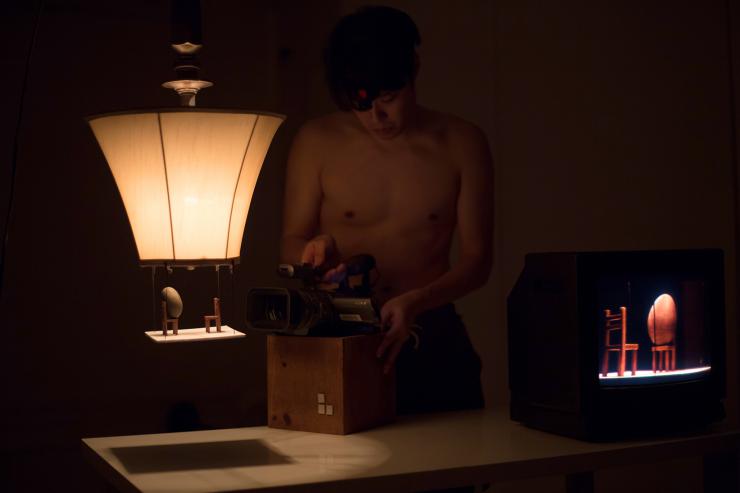
The final image of the show is a recreation of that minute of silence between Jeon and his father, where our hero, the rock, is placed in a miniature chair, which hangs in space from a lamp attached to the ceiling. The coup de grace is when Jeon points a video camera at the rock, and the image is blown up on a nearby monitor. The audience becomes nine-year-old Jeon, silently watching our stone-like father who can never show us his true face. The evening I attended, the audience remained long after reason would have told them the performance was over, enraptured by the silent rock floating in space or, perhaps, waiting for the rock to do the impossible and break the silence.
When I saw the rock in the chair, spinning in the ether, backlit by the blue glow of our wireless headphones, I wept. Not for a rock, but for Jeon and for myself, and for my mother and her father, and every parent, and my child, and every child, for the loss that is felt deep in the oceans of our souls, but that is held back by the floodgates we inherit at birth.

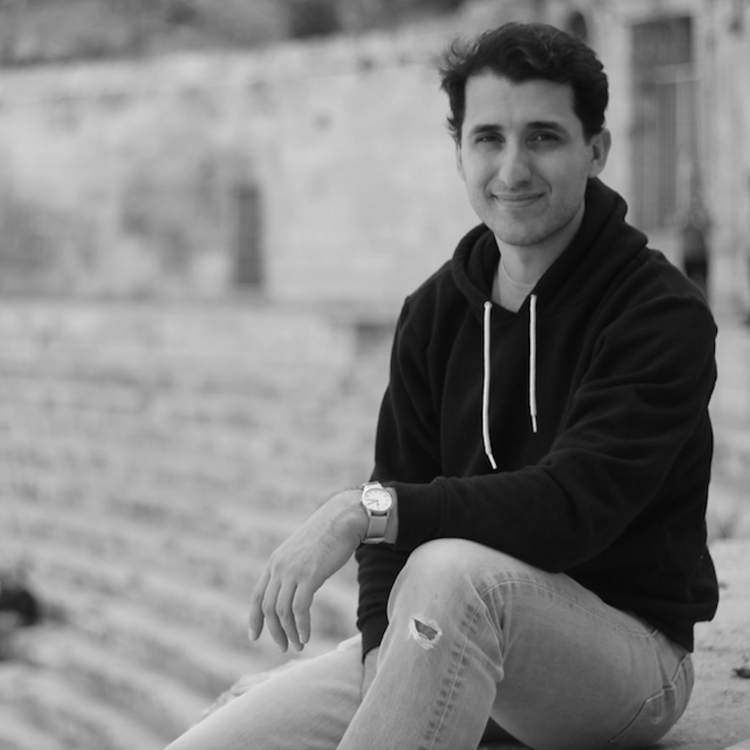
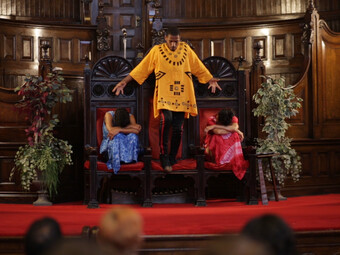

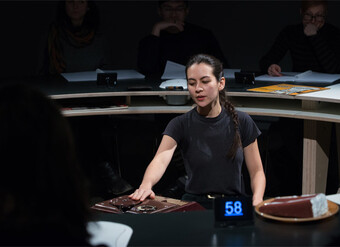

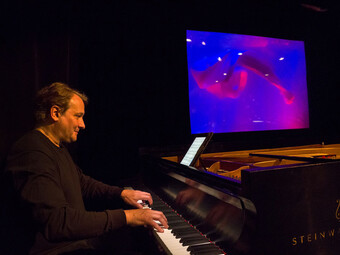

Comments
The article is just the start of the conversation—we want to know what you think about this subject, too! HowlRound is a space for knowledge-sharing, and we welcome spirited, thoughtful, and on-topic dialogue. Find our full comments policy here